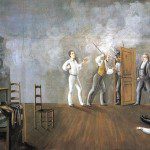Since Blake Ostler’s landmark article appeared in Dialogue in 1987, there’s been something of a trend among believing Mormon intellectuals. Increasingly, the tendency is to account for the English text of the Book of Mormon by positing a kind of weave of several agents operative in the production of the Book of Mormon—one of them divine (God, in some form), one of them human but ancient (the original authors of the book), and one of them human but modern (Joseph Smith). The most elaborate attempt to formulate a theory of translation along these lines is to be found in Brant Gardner’s The Gift and Power, published a couple of years ago by Greg Kofford Books.
There’s something quite admirable—perhaps necessary—about such an approach, from the perspective of a believer. With traditional belief, it insists on the historicity of the book, and it doesn’t shy away from affirming that there was some kind of divine hand in the production of the book. At the same time, it fully recognizes the sloppiness of the Book of Mormon—its grammatical faux pas, its unartful oral style, its most obvious anachronisms. From Ostler to Gardner, this approach represents a kind of honest faith, a faith willing to recognize that there are genuine obstacles to straightforward belief in the Book of Mormon on strictly secular grounds. And yet, I’ll confess that I’ve never myself felt fully comfortable with this approach. Perhaps I’m naturally happier with inconsistency of a sort—willing to affirm the irremediable truth of the book without feeling the need to account for that in secular terms even as I recognize the problems. Perhaps. But I think there’s more to this, and I want to see if I can’t spell out my discomfort here, and do so in rather broad terms.
As I think I’ve already made clear, the major motivation for a compromise position—that is, for an account of the Book of Mormon’s translation that allows Joseph Smith a certain part in the production—is the presence in the text of apparently unmistakable anachronisms. Whether it’s a theological trope that alludes to debates that began only in the medieval era, or whether it’s a conception of infant baptism peculiar to nineteenth-century America, or whether it’s a notion of race that doesn’t make sense in an ancient context, or whether it’s the presence of biblical texts postdating the asserted origins of the Book of Mormon, or whether it’s a borrowing of a turn of phrase from a modern source, or whether it’s a form of detailed prophetic anticipation largely foreign to the Hebrew tradition, there are all kinds of reasons one might grow suspicious of the Book of Mormon, accusing it of anachronism. To attribute a certain role to Joseph Smith in the production of the Book of Mormon allows such things to be accounted for. Whatever the original ancient authors of the Book of Mormon had to say in their own original settings, and despite the role played in the translation process by God himself, Joseph Smith may have introduced—whether consciously or not—all kinds of things from his own place and time into the book.
Why worry about this position? It’s not the idea that there may be human elements in the Book of Mormon that worries me. The book itself underscores that possibility. And it’s not the idea that there may be nineteenth-century elements in the Book of Mormon that worries me. I’m not sure what a translation is if it doesn’t figure out how to speak in a kind of strictly anachronistic way to the people who are meant to read the translation. No, what worries me is, I think, this: that this approach makes it necessary, in a way, to figure out where Joseph Smith has obscured the Book of Mormon’s message. If certain elements of the Book of Mormon are attributable to Joseph Smith while others must be attributed to ancient record keepers, it would seem necessary—perhaps especially given the common Mormon penchant for the historical—to do our best to strip the Book of Mormon of its modern accretions. This tendency is visible in the work of Blake Ostler, and it’s equally visible in the work of Brant Gardner. Both seem to feel a certain freedom to dismiss whatever smacks of the modern in the Book of Mormon while refusing to deny a certain normativity when it comes to whatever smacks of the ancient.
(So it seems to me. I’d be thrilled to hear rejoinders from Ostler and Gardner, as well as from other advocates of this approach!)
What’s at the bottom of my worry is a certain commitment to theological interpretation of scripture. This I might be able to illustrate by taking a concrete example. One of the more difficult anachronisms in the Book of Mormon is the presence there of Isaianic writings that most scholars believe had their origins in the Babylonian exile of the mid-sixth century, an exile that began at least a few years after the protagonists of the Book of Mormon claim to have left Jerusalem entirely. If one decides that the presence of such writings—what scholars call “Second Isaiah”—in the Book of Mormon can be attributed to Joseph Smith in some way, then I’m not sure how one can do serious theological interpretation of the Book of Mormon. The writings of Nephi that occupy the first large chunk of the Book of Mormon are built on sustained, detailed, innovative interpretations of Second Isaiah. Whoever produced the two books of Nephi was a careful and imaginative reader of the canonical Book of Isaiah, carefully attuned to repeated words and thematic patterns. Moreover, the text has Nephi state clearly that his principal purpose in writing is to provide these close readings and likenings of Isaiah for specific theological purposes. The consequence of all this is that to attribute the presence of Second Isaiah in Nephi’s writings to the modern translator is to make it more or less impossible to see what, if anything, in Nephi’s writings could be said to be the product of an ancient author. Just the bare outlines of the story about traveling to the New World and some of the events at that journey’s conclusion? Anything more? But nothing, at any rate, of what the supposedly ancient author claims was his chief focus in writing!
That doesn’t sit well with me. I think I’d be happy to admit that Joseph Smith had a certain limited role to play in the production of the Book of Mormon, but I’m not sure that such a suggestion is ultimately valuable unless it can be made more specific. Are all anachronisms to be linked to Joseph Smith? Or just certain kinds? How is one to decide which kinds? Unless a detailed methodology for determining Joseph Smith’s role in the text can be nailed down, it’s difficult to see the “compromise” theory of translation as anything more than a somewhat academically respectable way to save the historicity of the Book of Mormon while crippling the work of actually interpreting the text.
I’ve found it better, as a theological interpreter of the Book of Mormon, to take a rather different approach. Rather than assuming that certain elements in the text are to be attributable to a modern source, others to an ancient source, I assume a kind of integrity of the text. In the Book of Mormon, I assume, I’m presented with a coherent text that needs to be interpreted on its own terms. I assume only one source: the Book of Mormon itself. I don’t at all deny that there are traces of the ancient in the book, and I learn a good deal from what those trained in ancient history have to say about the book. But nor do I at all deny that there are traces of the modern in the book, and I learn a good deal from what those trained in modern history have to say about the book. In the meanwhile, I focus my attention principally on how the book, taken as an integral text, understands itself—in terms of its aims and purposes, in terms of its structures and literary features, in terms of its themes and theological interests.
That may not be entirely satisfying. Perhaps I’ve said little more than that I ignore the problem of the Book of Mormon’s translation. Maybe I’d sound a bit more responsible if I said that I leave to others the problem of the Book of Mormon’s translation. For my own part, I can’t really make sense of any of the three standard claims—that the book is entirely explainable in terms of the ancient world, that the book is entirely explainable in terms of the modern world, or that the book is entirely explainable as a determinate weave of the ancient and modern worlds. It might be that hard-working apologists will eventually provide satisfying answers to all objections to the book’s ancient origins. I’d be happy with that, though I’d be shocked if that ever happens (if for no other reason than that the Book of Mormon claims that it’s to be received in its weakness). On the other hand, it might be that hard-working critics will eventually provide satisfying answers to all objections to the book’s modern origins. I suppose I could be happy with that, but it’d be a hard sell (the incredible brilliance of the Book of Mormon can’t be accounted for in terms of what happened in a shack in Pennsylvania). On the other, other hand, it might be that the interpretive methodology implicit in the “compromise” theory of translation can be made more specific and satisfying. I think I’d be happy with that as well, though I’m not at all sure how it could overcome the kinds of worries I’ve outlined above.
And then I recently became aware of an alternative explanation, a twist on the compromise theory. I read just a week ago a draft of an essay by Roger Terry suggesting the possibility that Moroni, the Book of Mormon’s last contributor, was the translator. (His argument is interesting and worthy of attention. Watch for it.) Terry pictures Moroni struggling with the text he’d helped to produce anciently, attempting to put it into the vernacular English he found he had to use when coming to Joseph Smith in the 1820s, wrestling with the foreignness of an acquired language and fully aware of the prejudices and presuppositions of the audience it would have. I don’t at all know whether I could become convinced of this theory. I’ll confess, though, that I’m struck by the theological force of it. To suggest that a resurrected person from the ancient world might be given the task of both learning the intricacies of nineteenth-century American frontier English and attempting to wrestle ancient words into that form of English, still largely foreign, while worrying about how it’ll be received—what an idea! To insist on the stubbornness of the material signifier, even for resurrected being—that does a lot for me! It’s the kind of audacious idea Joseph Smith liked to throw around. It’s much more theologically satisfying in certain ways than a picture of an entirely passive prophet-translator, and it’s certainly much more theologically satisfying than a picture of a fully-in-control prophet-deceiver-translator. Of course, as I say, I don’t know that I can accede to it nonetheless.
In the end, I suppose I just can’t get terribly excited about trying to nail down—for critical or apologetic purposes—how the Book of Mormon came to be. As I work on the text of the Book of Mormon, I find myself overwhelmed with how much undiscovered territory there is, how much more needs attention… and how few folks seem to be dedicated to giving it their time. Until we have much more serious readings of the Book of Mormon itself, I find myself largely uninspired by attempts to determine how the thing was produced.
Except, perhaps, where the theory of translation might itself be theologically imaginative and inspiring.











